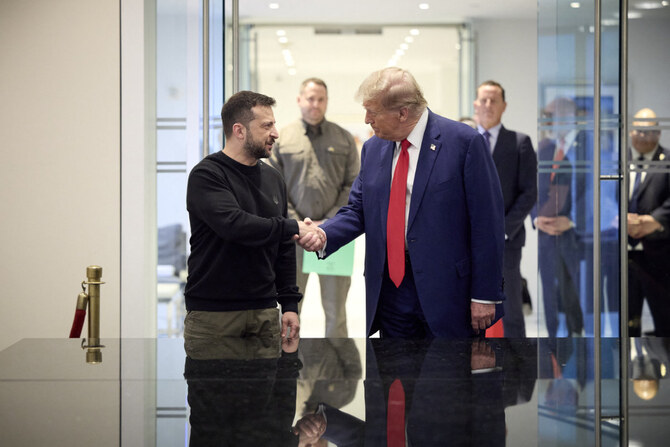NEW YORK: Donald Trump and Volodymyr Zelensky held high-stakes talks Friday following several attacks by the White House hopeful on the Ukrainian president as the looming American election raises questions over long-term US support for ally Kyiv in its war with Russia.
Foreign policy hawks have voiced fears that a second Trump term would spell disaster for Ukraine’s defense, as the Republican has repeatedly defended Russia’s President Vladimir Putin while voicing skepticism over US funding for Kyiv.
Zelensky had met Trump’s election rival Kamala Harris, as well as President Joe Biden, on Thursday in Washington and both pledged their support for Ukraine.
Trump — who this week accused Zelensky of refusing to “make a deal” to end the conflict — vowed to bring peace if he wins a second term in office as the two men addressed reporters after their tete-a-tete at Trump Tower in New York.
“It’s a shame but this is a war that should have never happened and we’ll get it solved. It is a complicated puzzle,” Trump said. “Too many people dead. Too many beautiful cities.”
Before the meeting, which lasted less than an hour, the former US president had hailed his alliance with Zelensky but added: “I also have a very good relationship — as you know — with President Putin.”
Zelensky responded that the pair shared a “common view that the war in Ukraine has to be stopped” and that it is imperative that Ukraine prevail.
Later in a post on X, Zelensky described the meeting as “very productive.”
“I presented him our Victory Plan, and we thoroughly reviewed the situation in Ukraine and the consequences of the war for our people,” Zelensky wrote. “Many details were discussed. I am grateful for this meeting. A just peace is needed.”
The meeting initially looked like it would be scrapped after Zelensky told The New Yorker magazine that Trump “doesn’t really know how to stop the war” and that his running mate J.D. Vance is “too radical.”
The interview was published amid outcry over the Ukrainian leader’s trip to Pennsylvania, a critical US election battleground, with Democratic politicians to thank US workers for manufacturing ammunition that is helping Kyiv’s war effort against Moscow.
House Republicans have launched investigations into the trip, suggesting it amounted to election interference, and calling for Ukraine’s ambassador in Washington to be fired.
Trump, who refused to say whether he wants Ukraine to defeat Russia during his debate with Harris earlier this month, hit back at Zelensky at a campaign rally Wednesday in North Carolina, berating him as “a man who refuses to make a deal” for peace.
Zelensky is in New York this week for the UN General Assembly, and has been looking to shore up support for his country’s war effort as it struggles on the battlefield in the third year of Moscow’s invasion.
The Ukrainian leader presented a so-called “victory” plan to Biden and Harris at the White House on Thursday, with Biden announcing a new military aid package worth nearly $8 billion for Kyiv.
Standing with Zelensky at her side, Harris did not mention Trump by name but said there were “some in my country who would instead force Ukraine to give up large parts of its sovereign territory.”
Zelensky said Friday that his talks in the United States went “exactly as needed.”
“The Victory Plan has been presented to America, and we explained each point in detail. Now, our teams will work to implement every step and decision,” he wrote on social media.
However, the row with Trump underscored how November’s US election could upend the support that Ukraine receives from its biggest backer.
Trump has echoed many of Putin’s talking points, saying at a rally earlier this week that Ukraine could not beat Russia, highlighting its 1812 defeat of Napoleon but ignoring more recent military defeats.
When Trump was president, he asked Zelensky for potentially damaging political material on Biden ahead of the 2020 election while withholding vital military aid that had already been approved by Congress — leading to the first of his two impeachments.
But the Republican had maintained good relations with Zelensky, pleased that the Ukrainian defended him over his conduct. Trump spent much of the impromptu news conference reminding reporters of Zelensky’s support.
























